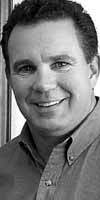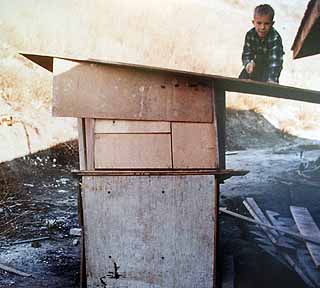
Surveys
DJC.COM
December 15, 2005
Pullman developer's mantra: Learn from your mistakes
Corporate Pointe Developers

Brelsford
|
Here is the fun part, nearly all of the completed projects were planned, designed, constructed and handed over to our management teams in just six years. And, all were developed with little or nothing down.
Many of you may be familiar with Robert G. Allen's books "Nothing Down" and "Creating Wealth," as well as the many infomercials featuring real estate millionaires that want to share their secrets — if you buy their tapes. Success is not my focus, learning from my failures is.

Photos courtesy of K. Duane Brelsford
K. Duane Brelsford made the front page of the Seattle Times in 1980 while attending Washington State University. He said it was one of his earlier attempts to evaluate risk and its potential influence on future decision-making.
|
Failure can be good
In my presentations to the students, I don't discuss my successes in depth. Instead, I instill to them that successes will come and go, but rarely do you remember them. However, I can tell you the alignment of the moons, the exact date, time and temperature along with all the details of the deals that I've screwed up!
Failures give you unlimited opportunities to reevaluate and learn, learn, learn. A $30,000 mistake I made over 10 years ago, given the size of the deals I am doing today, could cost me over $300,000 today. Had I not taken each and every failure and turned them into positive learning experiences, I would be licking my wounds and sulking. Certainly if that were the case, the last five to six years would not have turned out as successful.
| Tips for real estate investors |
|
• Don’t stop learning, you’ll never have enough knowledge.
• You’ll never get rich working for someone else, you will ultimately have to take the risk to go out on your own. • Be passionate, but don’t get emotional. • When negotiating, the first one who states a number loses. • Do your homework, and run a feasibility study or proforma on each project. • Surround yourself with professionals when completing a deal. • Most importantly, don’t be afraid to take risks — your mistakes will ultimate teach you more than you can learn from others. |
I would like to mention that my portfolio was created primarily in a community of 25,000 people. While many people overlooked Pullman, I found a ripe market that allowed me to expand into Spokane and Moscow and Lewiston, Idaho. With research and calculated risk, you can find potential niches in any given marketplace.
In each phase of the presentation, I talk about risk and how to develop your own risk levels, but the most important thing is how to reduce risk by learning. And, how do we most effectively learn? By making those oh so important mistakes.
Mistakes are created by failures in your learning progress or by allowing risk to play a larger role than it should have. Don't be afraid to take risk or make mistakes, it will only allow you to learn, learn, learn.
Know the lingo

Brelsford developed his first real estate project at age 5, learning about leverage in the process.
|
Real estate can be like poker: Everyone is after your chips. Learn to protect your chips by using professionals such as real estate agents, attorneys, title companies and appraisers — they can help you learn.
In my presentations I discuss how to talk the talk. I ask if anyone has been to France, then I ask if anyone has attempted to speak the language, some usually say "yes." Then I ask how did that go for you? The usual response is "not very well." (The French would rather you not slaughter their beautiful language than make a bad attempt to speak it.)
| 2 big mistakes |
|
I’ve made a multitude of mistakes throughout my career. Here are two that stand out. In 1985-86, a partner and I carried a note on a property that was to be paid back in two years. The person who bought the note couldn’t meet the required loan to value ratio, so she provided a promissory note with a personal guarantee. When the note was due, the buyer felt she had paid too much for the property. Since we didn’t record the note against any assets, we had the burden of proof in court. The end result was a settlement in which we took a $120,000 loss. In 1988-89, that same partner and I put $30,000 in earnest money down on a project that had a non-refundable clause after a certain time period. We took the risk because we were confident the project could pencil out. We lost the money when occupancy and financing commitments fell through. My risk levels and naive confidence were too high in both cases. A victim blames and a victor learns. |
This leads directly to bankers. Learn to speak the language or you will be a victim of defacing the coveted banker's language. Know about loan to value (LTV), loan to cost (LTC), debt coverage rate (DCR), capitalization rate (cap rate), net operating income (NOI) and proformas.
For the students, I discuss leverage and how to diversify. Then we move to the important influences on real estate — social, economical, environmental, governmental — in determining the highest and best use for a particular piece of property. Throughout the presentations, I focus on the multitude of errors and failures I have introduced to each phase of real estate throughout my career.
The students learn more from my failures than any of my successes — as I have.
K. Duane Brelsford is president and managing member of Pullman-based Corporate Pointe Developers. He oversees a real estate portfolio of 18 limited liability companies.
Other Stories:
- Richard Lee
- 8 questions office tenants should be asking
- It's time for housing in downtown Olympia
- Visionary property owners try some new tools
- Making today's mixed-use projects work
- How do lease options work?
- Resurrecting the Technology Corridor
- Will hurricanes puff up insurance rates here?
- How Trammell Crow hit the real estate jackpot
- Lifestyle centers: A return to Main Street USA?
- How rising interest rates will affect real estate
- Is it safe to jump back into the condo market?
- CBA is bullish on the commercial market
- Arthur Rubinfeld
- Bill Morton
- Here's what's in store for retail properties
Copyright ©2009 Seattle Daily Journal and DJC.COM.
Comments? Questions? Contact us.